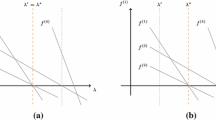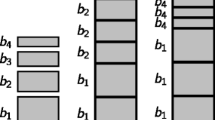Abstract
We consider approximation algorithms for packing integer programs (PIPs) of the form \(\max \{\langle c, x\rangle : Ax \le b, x \in \{0,1\}^n\}\) where A, b and c are nonnegative. We let \(W = \min _{i,j} b_i / A_{i,j}\) denote the width of A which is at least 1. Previous work by Bansal et al. (Theory Comput 8(24):533–565, 2012) obtained an \(\varOmega (\frac{1}{\varDelta _0^{1/\lfloor W \rfloor }})\)-approximation ratio where \(\varDelta _0\) is the maximum number of nonzeroes in any column of A (in other words the \(\ell _0\)-column sparsity of A). They raised the question of obtaining approximation ratios based on the \(\ell _1\)-column sparsity of A (denoted by \(\varDelta _1\)) which can be much smaller than \(\varDelta _0\). Motivated by recent work on covering integer programs (Chekuri and Quanrud, in: Proceedings of the Thirtieth Annual ACM-SIAM Symposium on Discrete Algorithms, pp 1596–1615. SIAM, 2019; Chen et al., in: Proceedings of the Twenty-seventh Annual ACM-SIAM Symposium on Discrete Algorithms, pp 1984–2003. SIAM, 2016) we show that simple algorithms based on randomized rounding followed by alteration, similar to those of Bansal et al. (Theory Comput 8(24):533–565, 2012) (but with a twist), yield approximation ratios for PIPs based on \(\varDelta _1\). First, following an integrality gap example from (Theory Comput 8(24):533–565, 2012), we observe that the case of \(W=1\) is as hard as maximum independent set even when \(\varDelta _1 \le 2\). In sharp contrast to this negative result, as soon as width is strictly larger than one, we obtain positive results via the natural LP relaxation. For PIPs with width \(W = 1 + \epsilon \) where \(\epsilon \in (0,1]\), we obtain an \(\varOmega (\epsilon ^2/\varDelta _1)\)-approximation. In the large width regime, when \(W \ge 2\), we obtain an \(\varOmega ((\frac{1}{1 + \varDelta _1/W})^{1/(W-1)})\)-approximation. We also obtain a \((1-\epsilon )\)-approximation when \(W = \varOmega (\frac{\log (\varDelta _1/\epsilon )}{\epsilon ^2})\). Viewing the rounding algorithms as contention resolution schemes, we obtain approximation algorithms in the more general setting when the objective is a non-negative submodular function.



Similar content being viewed by others
Notes
We can allow the variables to have general integer upper bounds instead of restricting them to be boolean. As observed in [1], one can reduce this more general case to the \(\{0,1\}\) case without too much loss in the approximation.
We say a family of subsets \({\mathcal {I}}\subseteq 2^N\) is downward closed if for all \(A \subseteq B \subseteq N\), if \(B \in {\mathcal {I}}\), then \(A \in {\mathcal {I}}\).
For \(x \in [0,1]^n\) we use \({\text {support}}(x)\) to denote the set \(\{i \mid x_i > 0\}\).
References
Bansal, N., Korula, N., Nagarajan, V., Srinivasan, A.: Solving packing integer programs via randomized rounding with alterations. Theory Comput. 8(24), 533–565 (2012). https://doi.org/10.4086/toc.2012.v008a024
Buchbinder, N., Feldman, M.: Constrained submodular maximization via a nonsymmetric technique. Math. Oper. Res. 44(3), 988–1005 (2019)
Chan, T.M.: Approximation schemes for 0–1 knapsack. In: 1st Symposium on Simplicity in Algorithms (2018)
Chekuri, C., Khanna, S.: On multidimensional packing problems. SIAM J. Comput. 33(4), 837–851 (2004)
Chekuri, C., Quanrud, K.: On approximating (sparse) covering integer programs. In: Proceedings of the Thirtieth Annual ACM-SIAM Symposium on Discrete Algorithms, pp. 1596–1615. SIAM (2019)
Chekuri, C., Vondrak, J., Zenklusen, R.: Dependent randomized rounding via exchange properties of combinatorial structures. In: 2010 IEEE 51st Annual Symposium on Foundations of Computer Science, pp. 575–584. IEEE (2010)
Chekuri, C., Vondrák, J., Zenklusen, R.: Multi-budgeted matchings and matroid intersection via dependent rounding. In: Proceedings of the Twenty-Second Annual ACM-SIAM Symposium on Discrete Algorithms, pp. 1080–1097. SIAM (2011)
Chekuri, C., Vondrák, J., Zenklusen, R.: Submodular function maximization via the multilinear relaxation and contention resolution schemes. SIAM J. Comput. 43(6), 1831–1879 (2014)
Chen, A., Harris, D.G., Srinivasan, A.: Partial resampling to approximate covering integer programs. In: Proceedings of the Twenty-Seventh Annual ACM-SIAM Symposium on Discrete Algorithms, pp. 1984–2003. SIAM (2016)
Ene, A., Nguyen, H.L.: Constrained submodular maximization: beyond 1/e. In: 2016 IEEE 57th Annual Symposium on Foundations of Computer Science (FOCS), pp. 248–257. IEEE (2016)
Feldman, M., Naor, J., Schwartz, R.: A unified continuous greedy algorithm for submodular maximization. In: 2011 IEEE 52nd Annual Symposium on Foundations of Computer Science, pp. 570–579. IEEE (2011)
Frieze, A., Clarke, M.: Approximation algorithms for the m-dimensional 0–1 knapsack problem: worst-case and probabilistic analyses. Eur. J. Oper. Res. 15(1), 100–109 (1984)
Harvey, N.J.: A note on the discrepancy of matrices with bounded row and column sums. Discrete Math. 338(4), 517–521 (2015)
Håstad, J.: Clique is hard to approximate within \(n^{1- \epsilon }\). Acta Math. 182(1), 105–142 (1999)
Hazan, E., Safra, S., Schwartz, O.: On the complexity of approximating k-set packing. Comput. Complex. 15(1), 20–39 (2006)
Mitzenmacher, M., Upfal, E.: Probability and Computing: Randomized Algorithms and Probabilistic Analysis. Cambridge University Press, Cambridge (2005)
Pritchard, D.: Approximability of sparse integer programs. In: European Symposium on Algorithms, pp. 83–94. Springer (2009)
Pritchard, D., Chakrabarty, D.: Approximability of sparse integer programs. Algorithmica 61(1), 75–93 (2011)
Raghavan, P., Thompson, C.D.: Randomized rounding: a technique for provably good algorithms and algorithmic proofs. Combinatorica 7(4), 365–374 (1987)
Srinivasan, A.: Improved approximation guarantees for packing and covering integer programs. SIAM J. Comput. 29(2), 648–670 (1999)
Trevisan, L.: Non-approximability results for optimization problems on bounded degree instances. In: Proceedings of the Thirty-Third Annual ACM Symposium on Theory of Computing, pp. 453–461. ACM (2001)
Vondrák, J.: Optimal approximation for the submodular welfare problem in the value oracle model. In: Proceedings of the Fortieth Annual ACM Symposium on Theory of Computing, pp. 67–74. ACM (2008)
Zuckerman, D.: Linear degree extractors and the inapproximability of max clique and chromatic number. In: Proceedings of the Thirty-Eighth Annual ACM Symposium on Theory of Computing, pp. 681–690. ACM (2006)
Author information
Authors and Affiliations
Corresponding author
Additional information
Publisher's Note
Springer Nature remains neutral with regard to jurisdictional claims in published maps and institutional affiliations.
C. Chekuri and K. Quanrud supported in part by NSF Grant CCF-1526799. M. Torres supported in part by fellowships from NSF and the Sloan Foundation. A preliminary version of this work appeared in the proceedings of the 20th conference on Integer Programming and Combinatorial Optimization (IPCO 2019)
Rights and permissions
About this article
Cite this article
Chekuri, C., Quanrud, K. & Torres, M.R. \(\ell _1\)-Sparsity approximation bounds for packing integer programs. Math. Program. 183, 195–214 (2020). https://doi.org/10.1007/s10107-020-01472-7
Received:
Accepted:
Published:
Issue Date:
DOI: https://doi.org/10.1007/s10107-020-01472-7




